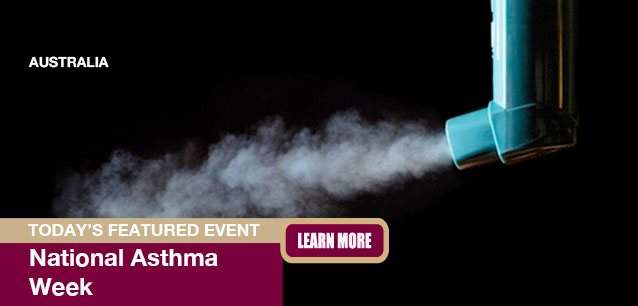 AD
AD
Country
- Africa
- Alcohol, Tobacco & Drugs
- Animals, Fish, Insects & Birds
- Anniversaries
- Australia
- Books
- Brazil & S.America
- Buddhism
Category
- Afghanistan, AF
- Aland Island, AX
- Albania, AL
- Algeria, DZ
- American, Samoa, AS
- Andarra, AD
- Angola, AO
- Anguilla, Al
Event Type
- Daily
- Weekly
- Annual
- Recurring
Duration
- All
- 1 Day
- 2 Day
- 3 Day
- 4 Day
- 5 Day
- 6 Day
Event Type
- Daily
- weekly
- Annual
- Recurring
Event Type
- Daily
- weekly
- Annual
- Recurring
Today is: September 01
Beslan School Siege and Massacre (RU) (2004)
Building Code Enforcement Staff Appreciation Day
Chicken Boy Day (US-CA)(1960s)
Constitution Day, (SK)(1992)
Day of Knowledge (RU)
Day of Unity (CL)
Dolphins of Taiji, Intl. Day of Awareness
Ecclesiastical Orthodox New Year (C)
Emma M. Nutt Day (1878)
Fall Weather Safety Day, Ntl.
First Parkash (S)(1604)
Germany Invades Poland (1939)
Ginger Cat Appreciation Day
Independence Day Holiday, (UZ)(1991)
Indoor Gardening Day, Ntl.
Labor Day (US)
Mouthguard Day
No Rhyme (Nor Reason) Day, Ntl.
Owara Kaze No Bon Festival (JP)
Poll Worker Recruitment Day, Ntl.
RMS Titanic Located (1985)
State of the Union (MX)
Stock Exchange Holiday (NYSE Closed)
Toy Testing Day, Intl.
Asthma Week (AU)
Conservation Week (NZ)
Independence Week, (BR)(1822)
Know Your Numbers Week (UK)
Know Your Numbers Week (UK)
Le Burger Week (CA)
Legacy Week (AU)
Literacy and Numeracy Week (AU)
Love Lamb Week (UK)
Mariachi y la Charrería, Intl. de (MX-JA)
Overdose Awareness Week, Ntl.
Payroll Week, Ntl.
Play Days
Self-University Week
Spina Bifida Awareness Week (AU)
Superhero Week for Muscular Dystrophy (AU)
Women's Health Week (AU)
Workplace Lactation Week
Workplace Lactation Week
Zero Waste Week (UK)
Alcohol and Drug Addiction Recovery Month, Ntl.
Alzheimer's Month, World
Animal Pain Awareness Month, Intl.
Arthritis Month (CA)
Atrial Fibrillation Awareness Month, Ntl.
Attendance Awareness Month
Attendance Awareness Month
Attention Deficit Hyperactivity Disorder (ADHD) Month
Baby Safety Month
Be Kind to Editors and Writers Month
Beach Month, World
Bear Necessities Month
Bear Necessities Month
Better Breakfast Month
Bhadon (S)
Bhadrapada (H)
Blackpool Illuminations (UK)
Blue September (AU/NZ)
Blueberry Popsicle Month, Ntl.
Bourbon Heritage Month, Ntl.
Brain Aneurysm Awareness Month, Ntl.
Campus Fire Safety Month, Ntl.
Campus Safety Awareness Month, Ntl.
Candle Month, World
Candle Month, World
Chicken Month, Ntl.
Childhood Cancer Awareness Month, Intl.
Childhood Obesity Awareness Month, Ntl.
Childhood Obesity Awareness Month, Ntl.
Children's Awareness Month
Cholesterol Education Month, Ntl.
Cinemalaya (PH)
Civil Service Month (PH)
Civil Service Month (PH)
Classical Music Month
Clean-up Month, Intl.
Clean-up Month, Intl.
College Savings Month
Coupon Month, Ntl.
Courtesy Month, Ntl.
Craniofacial Acceptance Month
DNA, Genomics and Stem Cell Education Month, Ntl.
Dementia Awareness Month (AU)
Democracy Month, Ntl.
Dystonia Awareness Month (AU)
Dystonia Awareness Month (CA)
Elul (J)
Fall Hat Month
Fashion Month (Spring/Summer)
Festival of Learning Have a Go Month (UK)
Festival of Learning—Have a Go Month (UK)
Food Hero Month, Be a, Ntl.
Food Safety Education Month, Ntl.
Footy Colours Day (AU)
Fruits and Veggies, More Matters Month
Fun Fair Month, World
Fun Fair Month, World
Gold Out Month, Pediatric Cancer
Gospel Music Heritage Month, Ntl.
Grains Month, Whole
Great Cycle Challenge (US)
Guide Dog Month, Ntl.
Guide Dog Month, Ntl.
Gynecologic Cancer Awareness Month
Happy Healthy Cat Month
Head Lice Prevention Month
Healthy Aging Month
Heart Month (IE)
Heart Month (IE)
Honey Month
Hunger Action Month (CA)
Hunger Action Month
ITP Awareness Month
ITP Awareness Month
Idiopathic Thrombocytopenic Purpura (ITP) Awareness Month
Infant Mortality Awareness Month, Ntl.
Intergeneration Month
Intergeneration Month
Leukemia and Lymphoma Awareness Month
Leukemia and Lymphoma Awareness Month
Library Card Sign-Up Month, Ntl.
Life Insurance Awareness Month, Ntl.
Liptember (AU)
Liptember (AU)
Low-Cholesterol, Low-Fat Pizza Bake, Great American
Miami Spice (US-FL)
Mold Awareness Month
Mushroom Month, Ntl.
National Month (CL)(1810)
Neighbor Month
Newborn Screening Awareness Month
Obesity Awareness Month, Childhood Ntl.
Odd Fellows Friendship Month
Odd Fellows Friendship Month
One-on-One Month
Organic Month, National (CA)
Organic September (UK)
Ovarian Cancer Awareness Month (CA)
Ovarian Cancer Month (US)
PCOS Awareness Month
PCOS Awareness Month
Pain Awareness Month
Pain Awareness Month
Papaya Month, Ntl.
Papaya Month, Ntl.
Passport Month, Ntl.
Peace Consciousness Month, Ntl. (PH)
Peace Consciousness Month, Ntl. (PH)
Peripheral Artery Disease Awareness Month, Ntl.
Peripheral Artery Disease Awareness Month, Ntl.
Pet Insurance Month, Ntl. (US/CA)
Pet Sitter Education Month
Pet Sitter Education Month
Photos Month, Save Your
Photos Month, Save Your
Piano Month, Ntl.
Pleasure Your Mate Month
Preparedness Month, Ntl. (2001)
Prostate Cancer Awareness Month (US/CA)
Rabi'ul-Awwal (M)
Recovery Month, Ntl.
Reye's Syndrome Awareness Month
Rice Month, Ntl.
Rule of Law Month (PH)
Rule of Law Month (PH)
Running of the Balls (US-TN)
STEPtember
Scroll Free September (UK)
Self-Improvement Month
Self-Improvement Month
Service Dog Month, Ntl.
Sewing Month, Ntl.
Sexual Health Awareness Month
Sexual Health Awareness Month
Shameless Promotion Month
Sickle Cell Month, Ntl.
Skincare Awareness Month, Ntl.
Sourdough September
Speak Out Month, World
Spinal Cord Injury Awareness Month, Ntl.
Sports Eye Safety Month, Ntl.
Square Dancing Month, Intl.
Straw Free September
Subliminal Communication Month
Suicide Prevention Month (US/CA)
Suicide Prevention Month (US/CA)
Therapy Dog Awareness Month (AU)
Tiger Month, Intl. Save a
Tiger Month, Intl. Save a
Update Your Resume Month
Urology Awareness Month (UK)
Urology Awareness Month (UK)
Vascular Disease Awareness Month
Vascular Disease Awareness Month
Wilderness Month, Ntl.
Wine Box Month, Intl.
Wine Month Ntl., California (US-CA)
Women's Friendship Month, Intl.
Workforce Development Month, Ntl.
Yoga Awareness Month, Ntl.
Youth Leadership Month, Ntl.
LEEP Calendar
Scroll to explore events active on this date.
LEEP INK FEATURES

August? Absolutely!
In August, we live through the Dog Days of Summer. It's hot and often humid, and those who can leave for better climates do. Down south, winter is in full force. August is also known as "the ...

In The Heat of July: July 2025 Events
Is it hot enough (or cold enough if you're below the equator) for you yet? There is actually a day for that! Like every month, I pick a diverse collection of events you may or may not know about. This ...

May Blooms: Events in May 2025
Along with October, May is one of the most densely packed months of the year. It's before the summer humidity and the last whole month of the school year. The weather is warming in t...
About Eosinophil Awareness Week
United States
Ends: May 21, 2022
DESCRIPTION:
Created by the US Congress in 2007, National Eosinophil Awareness Week (NEAW) addresses eosinophil-associated diseases.
Eosinophils (pronounced “ee-oh-sin-oh-fills”) are a type of white blood cell that helps our immune systems fight off infections and parasites. They also play a role in allergic reactions and inflammatory processes.
When a person has elevated numbers of eosinophils in their digestive system, tissues, organs, and/or bloodstream, without a known cause, he or she may have an eosinophil-associated disease.
These conditions are further characterized by the areas of the body in which the eosinophils have accumulated. A few examples include the esophagus (eosinophilic esophagitis), stomach (eosinophilic gastritis), or the bladder (eosinophilic cystitis).
Symptoms of eosinophil disease may vary depending on the area of the body affected, and by age. Patients often embark on a long, frustrating journey seeing many different specialists before a diagnosis is made. Although not commonly life-threatening, these chronic diseases require lifelong treatment and can cause debilitating symptoms. Most subsets of eosinophil-associated disease do not yet have an FDA-approved pharmaceutical indicated for treatment.
VIDEOS
SUPPORTING DOCUMENTS
Currently, this event does not have supporting documents.
ADDITIONAL IMAGES
Currently, this event does not have supporting images.
Where would you like to go now?
 AD
AD
By using this site. You are agreeing to use of cookies. Learn more in our Privacy Policy
/footer-logo.svg)
LEGAL: Excerpts and links may be used, provided that full and clear attribution is given to Jubilee LLC and LEEPCalendar.com, with appropriate and specific direction to the original content (Page URL). Additional documents, embedded videos and additional image rights retained by their creators and are provided to increase understanding of the event or topic.
Jubilee LLC reserves the right to accept or reject inclusion of events in this calendar. The appearance of an event in LEEP Calendar does not imply endorsement of the event, nor the organization championing the event by Jubilee LLC, its stakeholders, customers or subsidiaries. All dates, contact information, URLs, addresses, and information relating to any event, promotion or holiday are subject to change without notice and should be treated as estimated. Jubilee LLC, our stakeholders, customers and subsidiaries cannot warrant accuracy. Users of this application are solely responsible for verifying actual event date with organizers and additional sources prior to committing resources, financial, human or otherwise.



































































